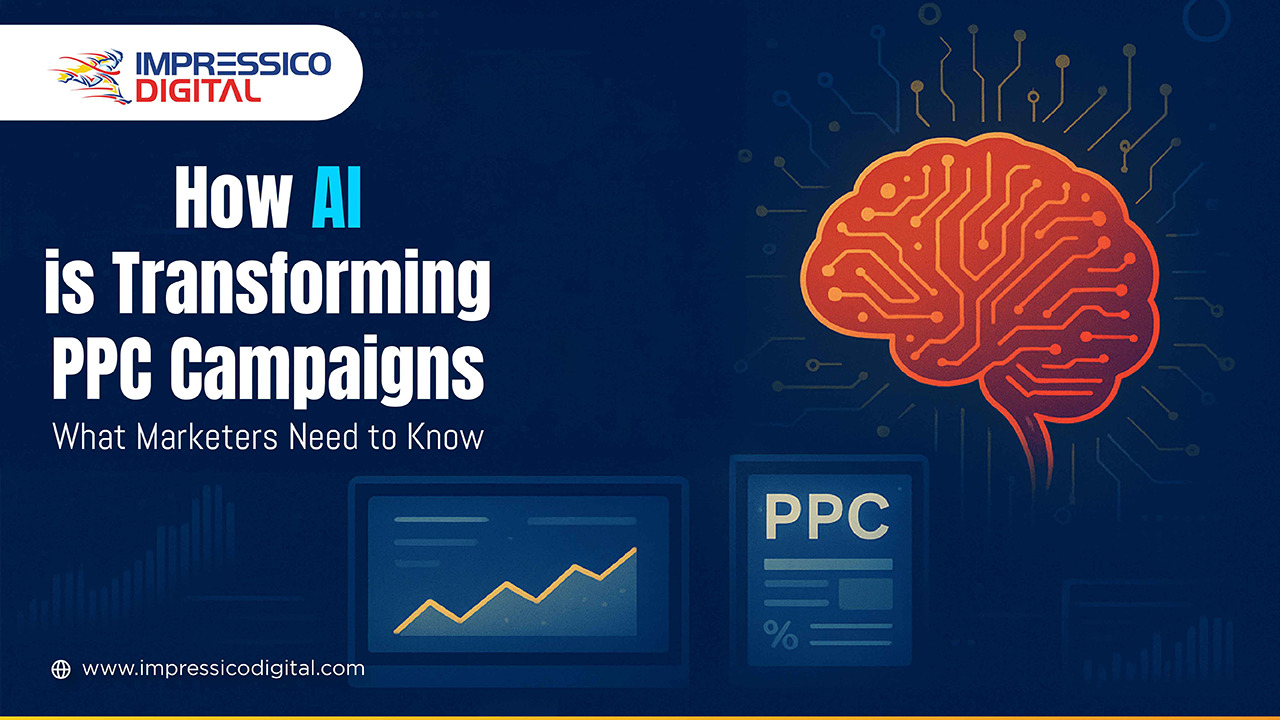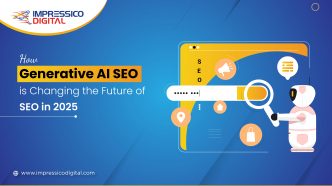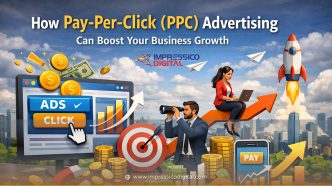In this era of rapid change in the digital universe, keeping up with advertising trends is not just important; it’s essential. As a progressive digital marketing agency, we at Impressico Digital think the next big leap forward in pay-per-click (PPC) advertising is artificial intelligence (AI). If you run or manage PPC campaigns, you need to know how AI is transforming the landscape now—and how that impacts your strategy, your budget, and your team.
What is AI in PPC?
AI in PPC is about machine-learning algorithms, predictive analytics, automation and data-driven decision-making applied to paid search and display campaign creation, optimization, bidding and reporting. It moves beyond the previous model of “set your keywords, set your bids, check manually” to one where systems are able to predict, optimize and learn from campaign performance in real time. For instance, according to Search Engine Land, AI is “shaking up the way marketers engage with their target audiences, fine-tune their campaigns and ultimately drive conversions.”
Whereas conventional Pay-Per-Click (PPC) had human teams deal with most decisions manually, AI adds automation at scale—programmatic bidding, adaptive creative testing, audience discovery, and high-end attribution. The outcome: campaigns that are more sensitive, usually more cost-efficient, and able to target potential buyers with increased precision.
Key methods in which AI is revolutionizing PPC campaigns
Here’s how the revolution is unfolding in real terms:
1. Smarter targeting and audience segmentation
With AI involved, targeting is no longer just selecting keywords or demographic segments. AI can look at big datasets—user search history, behavior, demographic signals, context, offline information—and determine patterns so it can forecast which audiences are likely to convert. For example, it allows “lookalike audiences” of users like your best customers, and anticipates conversion probability even before a user inputs a query.
That means your ad spend is wasted less on low-intent users and more aligned with the most important segments.
2. Automated bidding and budget allocation
AI introduces significant changes in the management of bids. Rather than having manual bids or static rules, AI is capable of assessing signals such as device type, location, time of day, search context and user behavior in order to dynamically alter bids. According to Search Engine Journal, “automated bidding strategies…are outperforming manual CPC approaches, increasing account efficiencies.”
Budget distribution also becomes agile. AI enables marketers to transition from concentrating solely on clicks to considering conversions, lifetime value and engagement—distributing funds where performance is best and scaling where results allow.
3. Creative optimization: ads, copy and landing pages
AI is not merely about bids and audiences. It’s remaking what ad copy appears as, visuals are selected and even landing pages respond. Tools are now capable of creating multiple ad versions, testing headlines on their own, and aligning creative assets to exact user profiles or search scenarios.
Landing pages can be dynamically updated—content varies based on user signals or forecasted affinities—reducing friction and enhancing conversion rates.
4. Real-time data, predictive analytics & attribution
One of the strongest capabilities of AI in PPC is predictive modeling and advanced attribution. Instead of making decisions based on clicks or basic last-touch models, AI assists in predicting which users will convert, which campaigns generate long-term value, and how to attribute conversions between channels and devices.
Consequently, marketers can move from tracking only short-term success to customer lifetime value, incremental lift and full-funnel performance.
5. Workflow and team-role evolution
AI doesn’t only impact campaigns—it impacts how your team operates. Instead of wasting hours watching bids, adjusting keywords and creating reports by hand, PPC managers are liberated to dedicate time to strategy, creative, and high-level analysis. According to Search Engine Land, “AI is assisting PPC managers to focus more on strategic initiatives… instead of manual operations.”
The advantages of AI-powered PPC for marketers and customers
Used effectively, AI-powered PPC provides a strong upside:
- Gains in efficiency & cost savings – fewer manual interventions, greater optimization, less wastage.
- Increased ROI and higher quality leads – smarter bidding and targeting = more conversions and improved value per ad dollar.
- Enhanced user experience & relevance – ads that talk to users more precisely, aligned landing pages, reduced irrelevant impressions.
- Scale and speed – AI systems process faster and react faster than manual teams could alone, allowing you to scale campaigns quickly and respond in real-time.
- Strategic emphasis – less time spent on maintenance tasks and more on what actually drives the needle (messaging, branding, creative strategy, analytics).
Challenges and pitfalls to be aware of
Nothing is without compromise. Here are the things you need to watch out for if you venture into AI-driven PPC:
Platform “black box” and control – Trusting blindly in AI has the consequence of potentially losing access to what the system is doing: “the future of PPC is AI-on-AI – but only one side knows your business.” Perhaps your ads or budget will be redirected into channels that are not best for your brand or your business objectives unless you’re engaged.
Quality of data, bias & privacy issues – AI is no better than the input data. Bad or biased input data creates poor quality outcomes or unforeseen effects. Also, privacy and regulatory requirements (particularly in the US and internationally) affect what you are allowed to do with user data.
Automation dependence / forgetting human intuition – No matter what, AI won’t itself take the place of the human strategist. Human judgment, creativity and context continue to be essential.
Changes in skill sets and organizational preparedness – Your staff needs to adjust. They’ll need to interpret AI results, make strategic choices, track outcomes and guide the machine carefully. Without training, you might not feel the full benefits.
Quick change and investment – Implementing AI involves investing in new processes, data infrastructure, tools and perhaps culture. If you do it as a one-off project you will be left behind the competition.
Bridging Intelligence: The Perfect Partnership Between AI and Human Expertise
At Impressico Digital, we see the future of PPC as being a tight integration of human strategy and AI-based execution. Here’s the way in which we lead our customers (and ourselves) into this evolution:
Strategy before technology: We start by learning about your business objectives, audience, creative resources and data foundation. AI technologies are built on top of that—not the other way around.
Data & readiness audit: We evaluate your current PPC stack, your audience signals, your conversion data, tagging, and CRM integrations. Without good data, AI cannot function at its best.
Clear goal-setting & oversight: We define well-defined objectives (ROAS, lead quality, LTV) and create dashboards to track performance. While we have controls in place—negative keywords, brand protections, and manual review of automated actions.
Best practice adoption: We suggest leveraging AI-powered bidding strategies, dynamic creative assets, audience expansion tools, and predictive modeling—but we complement these with human review and iteration.
Ongoing optimization & learning: We don’t “set and forget”. AI models get better, search behavior changes (particularly as AI search continues to develop), so we continuously test, review, and adapt.
Collaboration and team training: Our experts are experienced in deciphering AI insight, bringing it to life and working with creative, SEO and analytics teams to make sure the PPC channel is aligned with larger marketing strategies.
Through the integration of human intuition, creative vision and AI-powered operations, we provide assurance that campaigns are future-proof, scalable and high-performing.
Conclusion
AI is not a passing trend in PPC – it’s the power that is already driving the next wave of paid advertising. For any performance-oriented marketer or agency, adopting AI requires more than just flicking a switch. It requires establishing the proper foundation: good data, well-defined objectives, human control and strategic alignment.
If you’re willing to turbocharge your PPC campaigns—bring more in-depth insight, smarter automation and stronger results—then we should chat. Impressico Digital is standing by to assist you through the change and ahead of the curve.
Contact us today and let’s construct your future-proof PPC plan.
FAQs
- What types of PPC tasks can AI automate?
AI can perform a lot of the mundane campaign tasks like bid management, budgeting, targeting, ad creative experimentation, landing page variation experimentation, and performance reporting. This allows more time for strategy and creativity.
- Will AI totally replace human PPC managers?
No. AI is a super amplifier but not a substitute. Human marketers continue to strategize, make sense of the insights, provide brand direction and oversee creative work. Studies indicate the best teams combine AI with human supervision.
- What information do I require prior to embracing AI-facilitated PPC tools?
You require quality conversion data, well-tagged campaigns, clean audience signals, strong analytics and preferably CRM or aggregated first-party data. Without these fundamentals, AI tools tend to underperform or make incorrect decisions.
- What are the primary risks of utilizing AI in PPC campaigns?
Primary risks are loss of control (platform “black box”), algorithmic bias, brand objectives misalignment, data privacy, and over-automation without human oversight. A sound governance system can reduce those risks.
Want to know more about us? Follow us on social media!



